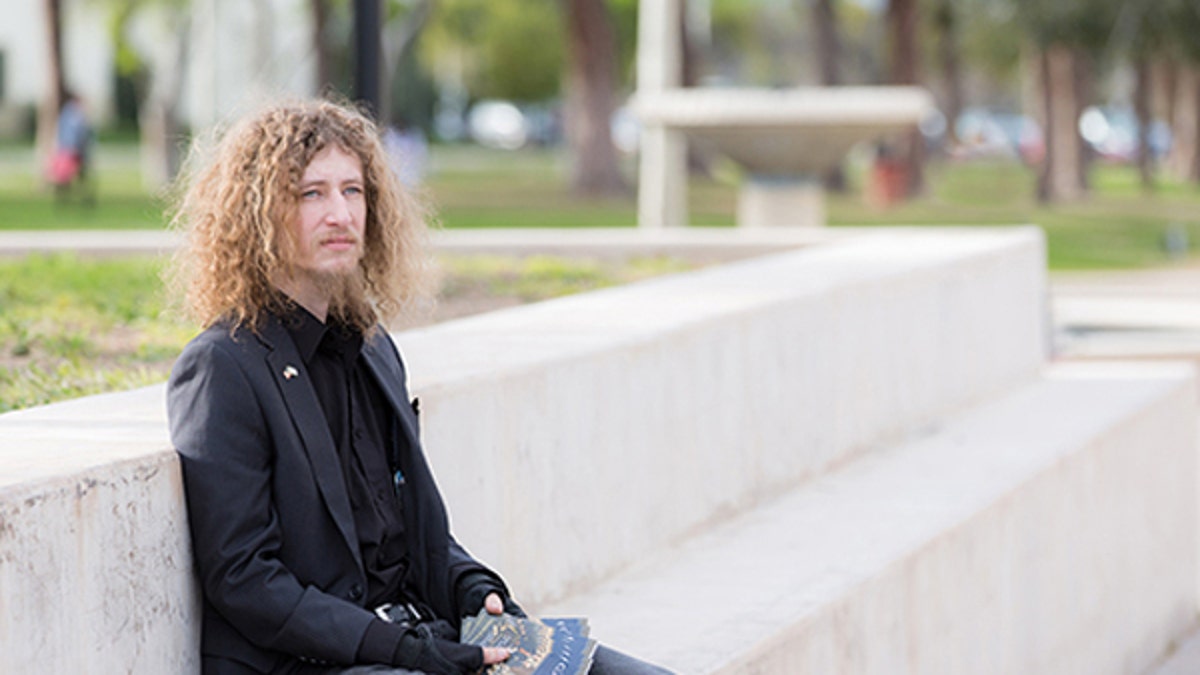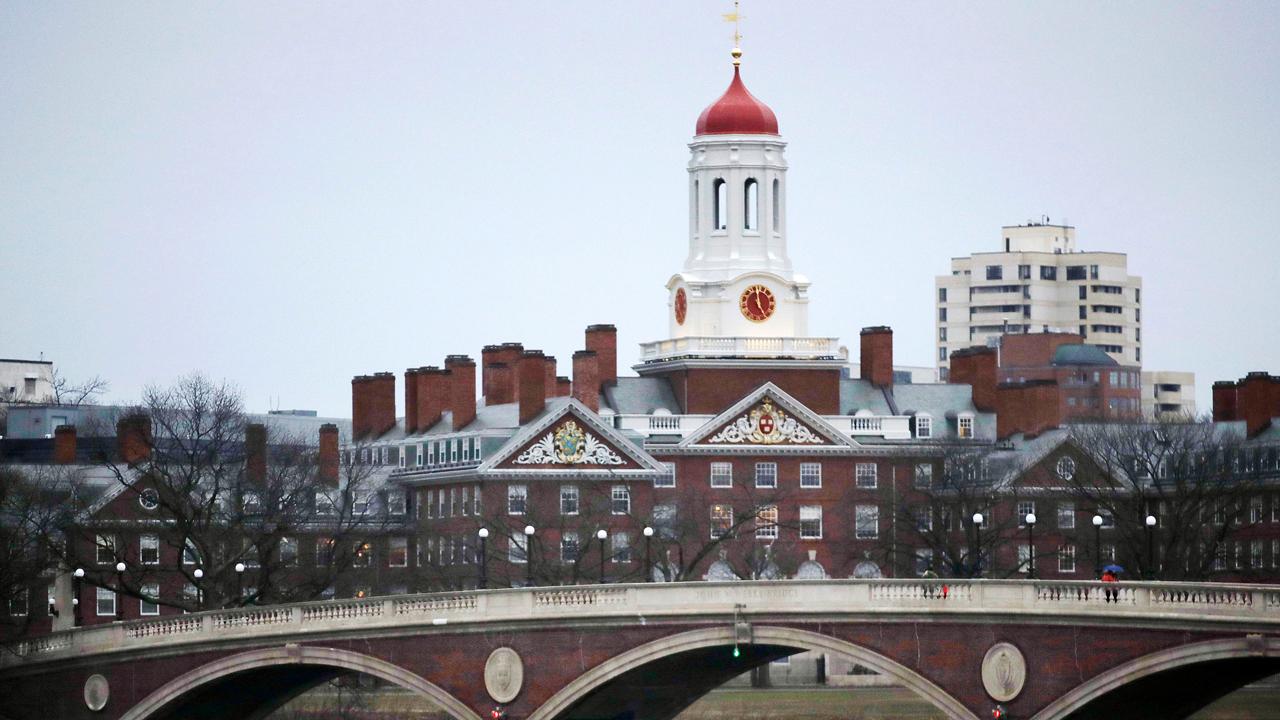Trump vows to sign college free speech executive order
President Trump demands the colleges defend the free speech of all Americans.
President Trump’s announcement of an impending executive order designed to pressure colleges and universities to support free speech is the latest salvo in a continuing battle between students and higher education officials nationwide.
Trump's order, which would require the institutions to support free speech in exchange for federal research dollars, has been hailed by some free speech advocates. The Foundation for Individual Rights in Education (FIRE), which specifically fights for free speech on campuses, said in a statement that it was “glad that this important national issue has the President’s attention” and was “looking forward to learning more about this initiative in the coming days.”
Here are ten recent examples of students, professors -- and sometimes even administrators – tussling between themselves over what can be done or said on or off campuses, public or private:

Pierce College student, Kevin Shaw, 27, filed a lawsuit against the Los Angeles Community College District after he was barred from passing out copies of a document because he wasn’t in the designated “free speech zone" on campus. (Photo courtesy of Dawn Bowery/FIRE)
Pierce College, Los Angeles Community College District
Los Angeles student Kevin Shaw says he was barred from handing out Spanish-language copies of the Constitution on the campus of Pierce College in 2016 because he wasn’t in the school’s designated “free speech zone,” which measured 616 square feet -- about the size of three parking spaces.
An administrator told him he could not distribute literature outside the designated zone, and Shaw said at the time he was also told that he would have to fill out a permit application to use the free speech zone and would be asked to leave campus if he refused to comply.
Shaw then took the district representing Pierce College to court. Through a settlement reached last year, the tiny area marked for students to exercise their first amendment rights will be abandoned altogether, revoking a district-wide policy that declared all property on the district’s nine campuses to be “non-public forums” with speech restrictions.

The decision to invite Nina Hartley to University of Wisconsin – La Crosse last year sparked criticism from University of Wisconsin System President Ray Cross. (Getty Images)
University of Wisconsin – La Crosse
The University’s free speech week in November ended up sparking an apparent rift between two administrators…over free speech.
University of Wisconsin System President Ray Cross took issue with UW-La Crosse Chancellor Joe Gow’s decision to bring former porn star-turned-sex educator Nina Hartley to campus to give a talk entitled “Fantasy Versus Reality: Viewing Adult Media With a Critical Eye” in November last year.
Cross sent a letter of reprimand to Gow for extending the invite, saying he had “personal underlying moral concerns” and was “deeply disappointed by your decision to actively recruit, advocate for, and pay for a porn star to come to the La Crosse campus to lecture students about sex and the adult entertainment industry.”
“While I understand and appreciate your commitment to freedom of expression and public discourse, as Chancellor, you need to exercise better judgment when dealing with matters such as these,” Cross wrote.
The letter also informed Gow that the decision would hurt his salary considerations with the Board of Regents going forward, and a review of the chancellor’s discretionary fund would be launched.
Long Island University Post
The private New York school summoned student Anand Venigalla to a mandatory meeting with administrators last year after he posted images on Facebook of him holding unloaded weapons at an off-campus Cabela’s sporting goods store.
LIU told FIRE that a student complained Venigalla “might have violent intentions”. It’s not clear how the student reached that determination, but FIRE suggests it possibly came from Venigalla posting the photos.
One of the images purportedly showed the student receiving assistance from a reenactor on how to hold a firearm.
FIRE did note though that LIU is a private school and therefore is not bound by the First Amendment.
Rensselaer Polytechnic Institute
Administrators and students have long been in a dispute over control of RPI’s student union, which FIRE says houses the university bookstore and spaces for organizations to operate.
The students, who fear the private university is trying to take over the facility, were blocked in 2017 from holding protests on the matter over homecoming weekend.
RPI, which has said in a past handbook that “students and student groups shall be free to examine and discuss all questions of interest to them and to express opinions publicly and privately,” declined an application to let the students demonstrate that year, insisting that available security was needed for their own programming.
It later emerged that RPI decided all demonstrations – no matter the size or location – were off limits for that weekend, effectively silencing their entire student body.
Perry High School – Gilbert, Arizona
Students at the Arizona school tell FOX10 Phoenix they were unfairly targeted by staff for wearing “Make America Great Again” attire during its “Party in the USA” theme day of spirit week on Friday.
The students claim staff told them to remove their hats and shirts, which they refused to do. Then one police officer told them “We are asking you to leave the campus right now,” another student claimed.
Parents were notified in advance that pro-Trump attire would not be permitted at a school dance on Saturday, but the students were not told of any similar bans on wearing the clothing to school, the station reported.
The school’s principal, Dan Serrano, describes the allegations differently.
“The administration addressed an incident that occurred at lunch this past Friday, when students carrying political signage caused a disruption and created [a] safety concern. The students were asked to put away the signage and they complied,” he said. “However, after school ended for the day, the students unveiled the signage again in a manner that again caused concern for student safety. When the school’s Resource Officer asked the students to leave campus, they declined.”
Harvard University
Harvard College, an undergrad program located within the prestigious Massachusetts school, rescinded offers of admission to at least ten prospective students of the Class of 2021 after they reportedly swapped memes and images on a private Facebook group chat.
The images, according to a report by the Harvard Crimson student newspaper in 2017, were passed around in a group called “Harvard memes for horny bourgeois teens.” They pertained to mocking ethnic and racial groups, the Holocaust and the deaths of children, with some even trying to make jokes that abusing children was sexually arousing, the newspaper added.
The school eventually caught on to the private chat and revoked the students’ admissions offers, the students said, while a spokesperson told the newspaper that “we do not comment publicly on the admissions status of individual applicants.”
Albion College
Alexander Tokie, a student at the private Michigan college, drew the attention of administrators in late 2017 after sending an email to his fellow College Republicans.
The email, according to FIRE, contained the language “Take the liberal tears from the idiot you just destroyed in your debate, dissemble your American made Springfield M1911 .45 caliber handgun and apply the tears in order to clean the mechanism, reassemble and proceed to purchase ANTIFA and ISIS hunting permits and max out on tags.”
The email eventually circulated around the wider school community and two administrators charged Tokie with violating the college’s policy against the “[u]se of, or threatened use of, physical force or violence.”
How serious Tokie was though with that language is up for debate.
Evergreen State College
Evergreen State College enrollment plummeted last year after the fallout from their controversial “Day of Absence” in May 2017 when all white people were asked to leave the campus.
The publicly funded college in Washington State – committed to social justice – became the poster child of a campus overrun by hyper-political correctness when students shut down the campus and shouted down then-evolutionary biology professor Bret Weinstein for merely questioning the event kicking white people off campus.
Weinstein, who describes himself as “deeply progressive,” ultimately lost his job and was labeled a “racist” and “white supremacist.”
Later that year, the school announced they would pay $450,000 to Weinstein and his wife as part of a settlement.

The "Your DNA is an abomination" column created a campus-wide backlash. (Courtesy Bethany Tisdel)
Texas State University
FIRE accused students, administrators and faculty of launching an attack on this university’s student newspaper after it published a controversial, anti-white “Your DNA is an abomination” column in 2017.
The newspaper eventually fired the author of the piece following threats from the student government to defund it and criticism from the university’s president.
FIRE, in an article on the case, wrote that “the Star has a right to decide for itself who it will employ or what it will publish.
“But when that disagreement crosses the line into threats against a newspaper’s funding and independence, it attacks one of our most cherished civil liberties,” it added.
University of Massachusetts-Amherst
The University of Massachusetts-Amherst changed a restrictive campus speech policy that a libertarian student group called “unconstitutional” following a months-long legal battle that ended in June 2018.
Young Americans for Liberty at UMass, represented by the legal nonprofit Alliance Defending Freedom, filed a lawsuit in January in district court against the public university for a rule that restricted “speeches and rallies” to less than one percent of the campus and only between noon and 1 p.m. each day on one side of the student union.
University spokesperson Mary Dettloff told Fox News they dropped the 30-year-old rule because “it is rarely, if ever, enforced and could be misinterpreted as a restriction on free speech.”
Fox News’ Perry Chiaramonte and Caleb Parke contributed to this report.












































